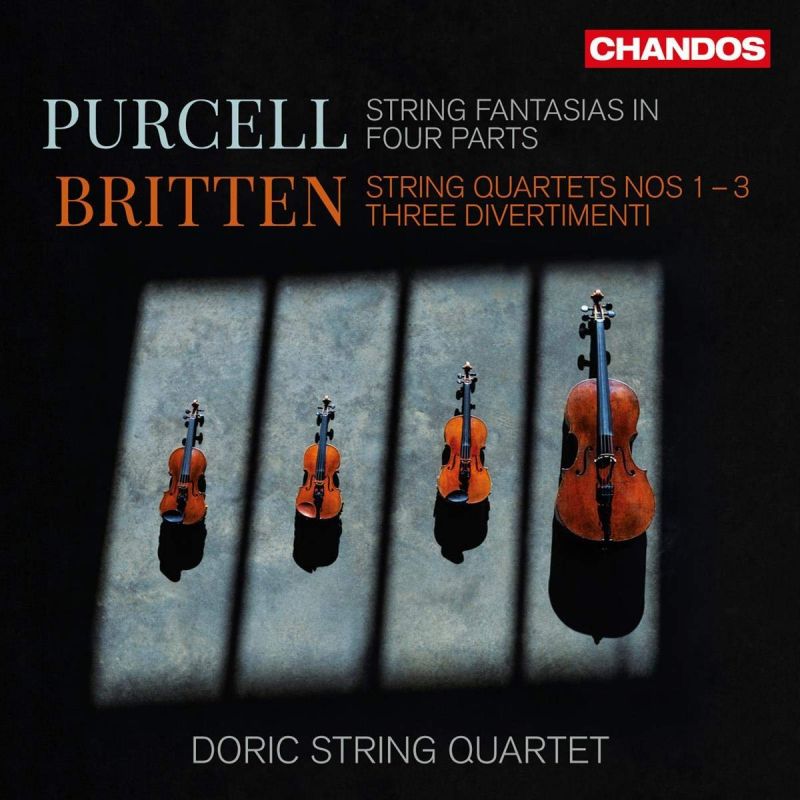BRITTEN; PURCELL String Quartets (Doric Quartet)
View record and artist detailsRecord and Artist Details
Composer or Director: Henry Purcell, Benjamin Britten
Genre:
Chamber
Label: Chandos
Magazine Review Date: 05/2019
Media Format: CD or Download
Media Runtime: 112
Mastering:
DDD
Catalogue Number: CHAN20124 2

Tracks:
| Composition | Artist Credit |
|---|---|
| String Quartet No. 1 |
Benjamin Britten, Composer
Benjamin Britten, Composer |
| (3) Divertimentos |
Benjamin Britten, Composer
Benjamin Britten, Composer Doric String Quartet |
| String Quartet No. 3 |
Benjamin Britten, Composer
Benjamin Britten, Composer Doric String Quartet |
| Fantasias in Four Parts |
Henry Purcell, Composer
Henry Purcell, Composer |
| String Quartet No. 2 |
Benjamin Britten, Composer
Benjamin Britten, Composer Doric String Quartet |
Author: Tim Ashley
The set also, however, reflects upon the indelible imprint left by Purcell’s music on Britten’s work, which is sometimes taken as read, though the juxtaposition here is effective and telling. The Second Quartet was famously written to mark the 250th anniversary of Purcell’s birth, while the great closing Passacaglia of the Third was Britten’s last deployment of a form he took from his predecessor and made his own. Moreover, hearing the Purcell Fantasias, particularly Nos 8 and 9 (Z739 and 740) in D minor and A minor respectively, in proximity to the First Quartet is to be reminded of their closeness in mood to the patterns of introspection and energy that give the First both its structural integrity and its nostalgic tone, particularly in its long, finely wrought slow movement.
The performances are all superbly judged and controlled, balancing fragility with strength, restraint with great depth of feeling. The opening of the First, with its high, ethereal phrases offset by worldly, guitar-like cello twangs, is rich with ambiguities, while the Andante calmo, its long violin solo played with exquisite poise by Alex Redington, grieves quietly for the war-torn England Britten left behind during his American sojourn. In the Second, the Doric offset formal logic with deep emotional resonance, sweeping us through the ceremonies and wonders of the final Chacony with great refinement and dignity before we reach the final moments of assertion and grandeur. The Third, haunted by thoughts of imminent mortality, bids farewell to life and love with quiet dignity and gazes towards infinity as time ticks away towards the close: it’s wonderfully done, and you can’t help but be moved by it.
The early Divertimenti, played with considerable wit and elegance, provide some much-needed contrast to the intensity of it all, while the counterpoint of Purcell’s Fantasias is finely realised in performances of considerable weight and finesse. Comparisons here are perhaps invidious. I have great fondness for the Amadeus Quartet’s slightly more spacious way with the Second in their 1977 performance (Testament DVD, 2/06), and if you like a more overtly dramatic approach to this repertory, then you may prefer the Belcea Quartet’s fractionally more extrovert interpretations (EMI, 7/05). But this is a major cycle, engaging and profound in equal measure, and you need to hear it.
Discover the world's largest classical music catalogue with Presto Music.

Gramophone Digital Club
- Digital Edition
- Digital Archive
- Reviews Database
- Full website access
From £8.75 / month
Subscribe
Gramophone Full Club
- Print Edition
- Digital Edition
- Digital Archive
- Reviews Database
- Full website access
From £11.00 / month
Subscribe
If you are a library, university or other organisation that would be interested in an institutional subscription to Gramophone please click here for further information.




